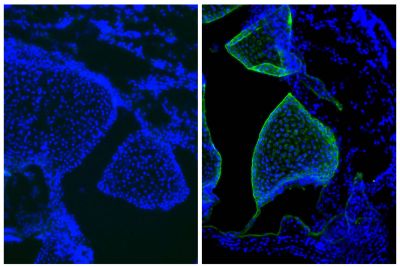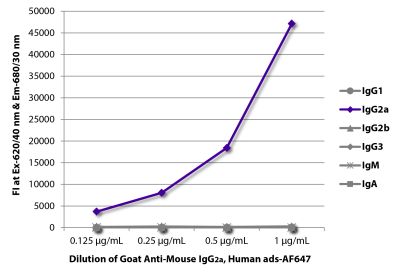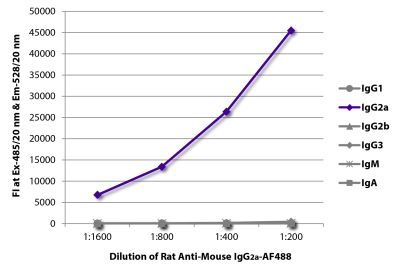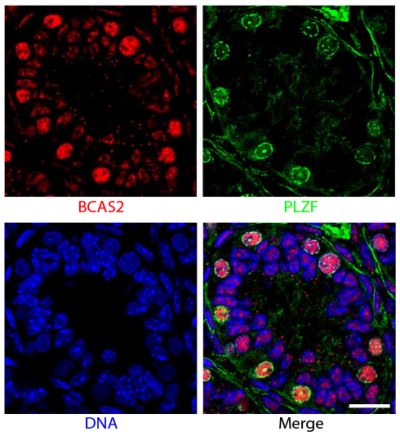Mouse Anti-Human CD95-UNLB (DX2)
Cat. No.:
9730-01
Purified Anti-Human CD95 antibody for use in flow cytometry, immunohistochemistry / immunocytochemistry, immunoprecipitation, ELISA, and apoptosis assays.
$177.00
| Clone | DX2 |
|---|---|
| Isotype | Mouse (C3H/He) IgG1κ |
| Isotype Control | Mouse IgG1-UNLB (15H6) |
| Specificity | Human CD95 |
| Alternative Names | APO-1, Fas, TNFRSF6 |
| Description | CD95, also known as Fas and APO-1, is a 45 kDa type I transmembrane glycoprotein and a member of the tumor necrosis factor receptor superfamily. It is expressed by activated lymphocytes, monocytes, neutrophils, fibroblasts, and cell lines. Fas ligand binding to CD95 induces apoptosis in activated mature lymphocytes thereby playing a role in maintaining peripheral tolerance. Crosslinking of CD95 by the monoclonal antibodies DX2 and DX3 delivers an apoptotic signal to Fas-sensitive cells indicating that these monoclonal antibodies recognize a functional epitope of CD95. |
| Immunogen | Human CD95 transfected L cells |
| Conjugate | UNLB (Unconjugated) |
| Buffer Formulation | Borate buffered saline, pH 8.2 |
| Clonality | Monoclonal |
| Concentration | 0.1 mg/mL |
| Volume | 1.0 mL |
| Recommended Storage | 2-8°C |
| Applications |
Flow Cytometry – Quality tested 1,2,8-15 Immunohistochemistry-Frozen Sections – Reported in literature 2 Immunohistochemistry-Paraffin Sections – Reported in literature 3,4 Immunocytochemistry – Reported in literature 5 Immunoprecipitation – Reported in literature 5,6 ELISA – Reported in literature 7 Apoptosis – Reported in literature 1,8 |
| RRID Number | AB_2797073 |
| Gene ID |
355 (Human) 574332 (Rhesus) 103216224 (Green Monkey) 105587157 (Sooty Mangabey) |
| Gene ID Symbol |
FAS (Human) FAS (Rhesus) FAS (Green Monkey) FAS (Sooty Mangabey) |
| Gene ID Aliases | ALPS1A; APO-1; APT1; CD95; FAS1; FASTM; TNFRSF6; CD95 |
| UniProt ID |
P25445 (Human Q9BDP2 (Rhesus Q9BDN4 (Sooty Mangabey |
| UniProt Name |
TNR6_HUMAN (Human) TNR6_MACMU (Rhesus) TNR6_CERAT (Sooty Mangabey) |
Documentation
Certificate of Analysis Lookup
Enter the Catalog Number and Lot Number for the Certificate of Analysis you wish to view
- 1. Cifone MG, De Maria R, Roncaioli P, Rippo MR, Azuma M, Lanier LL, et al. Apoptotic signaling through CD95 (Fas/Apo-1) activates an acidic sphingomyelinase. J Exp Med. 1993;177:1547-52. (Immunogen, Apoptosis, FC)
- 2. Metkar SS, Naresh KN, Redkar AA, Soman CS, Advani SH, Nadkarni JJ. Expression of Fas and Fas ligand in Hodgkin's disease. Leuk Lymphoma. 1999;33:521-30. (IHC-FS, FC)
- 3. Sergi C, Kahl P, Otto HF. Contribution of apoptosis and apoptosis-related proteins to the malformation of the primitive intrahepatic biliary system in Meckel syndrome. Am J Pathol. 2000;156:1589-98. (IHC-PS)
- 4. Zietz C, Rumpler U, Stürzl M, Löhrs U. Inverse relation of Fas-ligand and tumor-infiltrating lymphocytes in angiosarcoma: indications of apoptotic tumor counterattack. Am J Pathol. 2001;159:963-70. (IHC-PS)
- 5. Parlato S, Giammariolo AM, Mogozzi M, Lozupone F, Falchi M, Malorni W, et al. CD95 (APO-1-Fas) linkage to the actin cytoskeleton through ezrin in human T lymphocytes- a novel regulatory mechanism of the CD95 apoptotic pathway. EMBO J. 2000;19:5123-34. (ICC, IP)
- 6. Lozupone F, Lugini L, Matarrese P, Luciani F, Federici C, Iessi E, et al. Identification and relevance of the CD95-binding domain in the N-terminal region of ezrin. J Biol Chem. 2004;279:9199-207. (IP)
- 7. Jodo S, Kobayashi S, Kayagaki N, Ogura N, Feng Y, Amasaki Y, et al. Serum levels of soluble Fas/APO-1 (CD95) and its molecular structure in patients with systemic lupus erythematosus (SLE) and other autoimmune diseases. Clin Exp Immunol. 1997;107:89-95. (ELISA)
- 8. Boonstra JG, van der Woude F, Wever PC, Laterveer JC, Daha MR, van Kooten C. Expression and function of Fas (CD95) on human renal tubular epithelial cells. J Am Soc Nephrol. 1997;8:1517-24. (Apoptosis, FC)
- 9. Ruffell B, Johnson P. Hyaluronan induces cell death in activated T cells through CD44. J Immunol. 2008;181:7044-54. (FC)
- 10. Szyszko EA, Brun JG, Skarstein K, Peck AB, Jonsson R, Brokstad KA. Phenotypic diversity of peripheral blood plasma cells in primary Sjögren's syndrome. Scand J Immunol. 2011;73:18-28. (FC)
- 11. Daflon-Yunes N, Pinto-Silva FE, Vidal RS, Novis BF, Berguetti T, Lopes RR, et al. Characterization of a multidrug-resistant chronic myeloid leukemia cell line presenting multiple resistance mechanisms. Mol Cell Biochem. 2013;383:123-35. (FC)
- 12. Liu J, Ewald BA, Lynch DM, Denholtz M, Abbink P, Lemckert AA, et al. Magnitude and phenotype of cellular immune responses elicited by recombinant adenovirus vectors and heterologous prime-boost regimens in rhesus monkeys. J Virol. 2008;82:4844-52. (FC, Rhesus Reactivity)
- 13. Zahn RC, Rett MD, Korioth-Schmitz B, Sun Y, Buzby AP, Goldstein S, et al. Simian immunodeficiency virus (SIV)-specific CD8+ T-cell responses in vervet African green monkeys chronically infected with SIVagm. J Virol. 2008;82:11577-88. (FC, African Green Monkey Reactivity)
- 14. Vanderford TH, Slichter C, Rogers KA, Lawson BO, Obaede R, Else J, et al. Treatment of SIV-infected sooty mangabeys with a type-I IFN agonist results in decreased virus replication without inducing hyperimmune activation. Blood. 2012;119:5750-7. (FC, Sooty Mangabey Reactivity)
- 15. Sumpter B, Dunham R, Gordon S, Engram J, Hennessy M, Kinter A, et al. Correlates of preserved CD4+ T cell homeostasis during natural, nonpathogenic simian immunodeficiency virus infection of sooty mangabeys: implications for AIDS pathogenesis. J Immunol. 2007;178:1680-91. (FC, Sooty Mangabey Reactivity)
See All References







